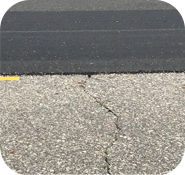In terms of safety, it became clear that a typical solution such as an asphalt overlay would not be acceptable. Though quick and simple, this solution would result in drop-offs too high to meet federal guidelines and too dangerous for the traveling public. Mitchell County needed a solution that would not alter Glen Elder Road’s surface elevation.
Given this information, and upon evaluating the core provided by Coughlin and the mix design provided by Paragon, it was decided that a 4-inch CIR finished with an appropriate chip seal would be optimal.
In stark contrast to a mill and fill, the total cost for this option, including materials and workmanship, was approximately $102,000 per centerline mile — at $87,000 per centerline mile for the CIR plus $15,000 per centerline mile to install the chip seal. That’s a savings of $68,000 per centerline mile over the mill/hotmix option.
In addition, the CIR option would address cracks down to 4-inches deep, whereas the mill and fill option would only address the top two inches of asphalt. According to industry standards, where cracks return on average one year later per inch of material, the CIR option is expected to manage cracking twice as long as the traditional mill and fill solution.
Application Highlights
During the CIR process, four inches of the existing pavement on Glen Elder Road were milled, mixed with Ergon A&E’s CIR emulsion, and then replaced.
Following the CIR process, Ergon’s CRS-1HP chip seal emulsion was applied at a shot rate of 0.35 gallons per square yard with ½-inch quartzite aggregate chips. Chip seals are typically applied following CIR applications to serve as wearing courses and/or to address any surface irregularities.
Ultimately the safest solution for any road is a solution that lasts. By using CIR finished with a chip seal, Mitchell County was able to reduce the cost of the treatment while increasing its efficacy, reduce construction time, keep motorists safe, and keep the traveling public away from unsafe drop-offs.










